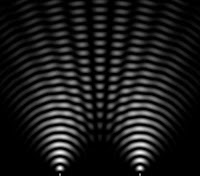What is interference?
Interference is a term used in physics for the phenomenon resulting from the combination of waves differing in phase. If two stones are thrown into water, the meeting of the concentric waves produces interference. A train of waves, set up in a rope by moving it up and down, meeting earlier ones reflected from the fixed end, produces interference, resulting in nodes and loops if properly timed. Two sound waves of equal length and intensity meeting in opposite phase may result in total silence, as in certain directions near a vibrating tuning fork. The interference of sound waves of different lengths gives rise to the familiar "beats" as when C and D on a piano are struck at the same time. It is in light, however, that the most interesting results of interference occur. A familiar example is in the color of a soap film, oil on water, or cracks in ice. The light, upon striking the thin surface is partly reflected while a part enters and is reflected from the second surface. These meet in the eye at slightly differing phases, producing color which varies with the thickness of the film. Interference is of the greatest scientific importance, for as a result of this phenomenon mainly, was the wave theory of light established.
